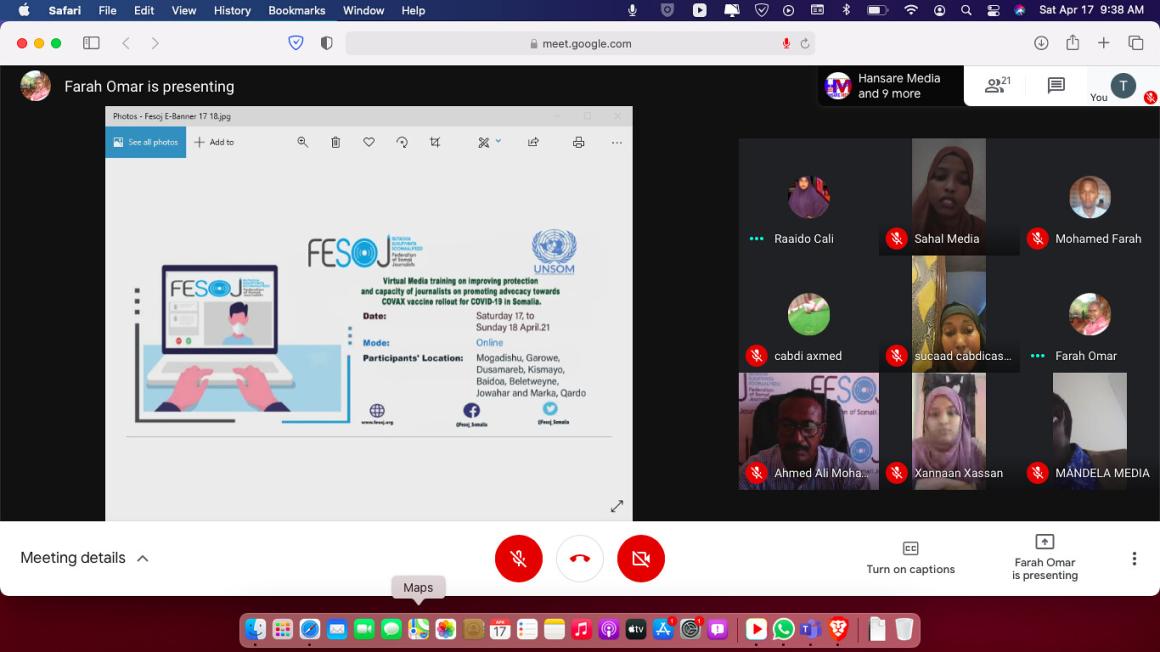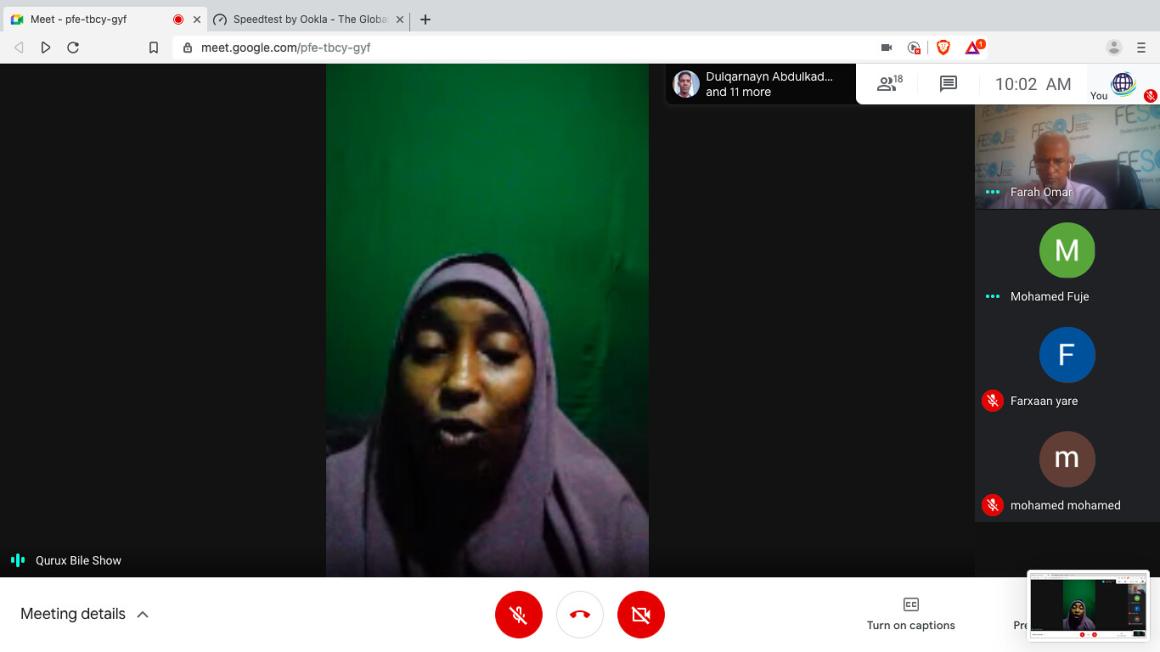Mogadishu – How can Somali journalists help in the fight against COVID-19? What role can they play in keeping individuals and communities safer? A two-day online training for Somali journalists just recently ended, focused on these questions and more, as it addressed safety and prevention measures against COVID-19.
The training was followed by a one-day panel discussion on awareness-raising programmes and promotion of the COVAX vaccine roll-out.

Overall, 45 journalists from various media outlets – radio, TV, and digital news platforms – from Mogadishu, Baidoa, Garowe, Kismayo, Beletweyne, Jowhar, Galkayo, Marka and Qardo have participated in the three-day event.
The virtual training workshop and panel discussion have been facilitated by the Federation of Somali Journalists (FESOJ) and organized with support from the United Nations Assistance Mission in Somalia (UNSOM).
COVAX Vaccine
The training aimed at reinforcing journalists’ capacity to support community preparedness for vaccine distribution, and advocate for the benefits of vaccines as a way to fight against the COVID-19 pandemic in Somalia, through media reporting and advocacy campaigns.
“The training focused on the main themes like safety procedure on COVID-19 prevention, media coverage and advocacy campaign for COVAX vaccine introduction in Somalia, and production of radio drama for awareness-raising on the COVAX vaccine rollout to curb the spread of the pandemic,” FESOJ's Secretary General, Farah Omar Nur, said.

He also added that the key topics covered included introduction to the Oxford-AstraZeneca vaccine, dismantling misconceptions about the vaccine, the need for the media to support advocacy related to the vaccination roll-out, and safety guidelines for the journalists reporting on the pandemic.
“We emphasized that journalists must adhere to ethical principles of reporting about COVID-19 vaccines. Journalists must check the accuracy and veracity of the information before they report. They should not contribute to circulating fake news and misinformation,” he said.
Hanan Hassan, a medical doctor participating in the sessions as trainer, stressed the imperative for journalists to be well-informed on the importance of the vaccine, so that they can inform the community.
“The public has accepted the vaccine inoculation, despite dissemination of fake news saying the vaccine causes blood clotting. The public has understood the background and origins of the pandemic, and the values of the vaccine. Furthermore, frontline health workers and vulnerable people will be given priority for immunization, and journalists are needed to pass on that message to the people,” Dr. Hassan said.
During the panel discussion, Dr. Mohamed Mohamud Fuje, Somalia’s Chief Medical Advisor and Chairperson of Somali National Committee for COVID-19, stressed the importance of COVAX vaccines in fighting the spread of the virus. He noted that the National Committee for COVID-19, comprising representatives of the Federal Ministry of Health, the Ministry of Information and Banadir Regional Authority, was responsible for approving the distribution of COVID-19 vaccines and for supporting communities to accept the vaccines to contain the spread of the disease in Somalia, and plays a key role in the efforts to fight the rumours against the vaccine.
Validating the medical experts’ views, Mohamed Mohamud Adde, a media professional and former BBC Somali news presenter, highlighted that journalists had a critical role in disseminating the right information on the efficacy of the COVID-19 vaccine. He further added that the public would benefit from thorough, accurate reporting and reliable information.
Impact on Journalists
Participants expressed their satisfaction with the training and were enthusiastic about putting what they have learned into practice.
“I am pleased to have taken part in this training, as I have gained useful knowledge. A well-informed journalist can pass on accurate information to the public, and this will, in turn, contribute to better awareness and understanding of the values of the COVAX vaccine,” said Sucaad Abdiaziz Dahir, a reporter from Mogadishu working with Somali Cable TV.

Another participant, Burhan Adeysay, a producer working with Puntland TV in Galkayo, considered himself empowered with the necessary skills to produce programmes and promotional campaigns on vaccines.
“We have learned lessons on the best practices to advocate for preventing the spread of COVID-19, and we have been endowed with the necessary skills to prepare media programmes on COVID-19,” he said.
The case was also true for Shukri Ismail, a radio/TV journalist from Baidoa.
“I had the opportunity to be trained on ethical COVID-19 situations reporting, the difference between fake news and propaganda, and the role of influencers and prominent community members in the media advocacy campaign for the COVAX vaccine,” she said.
UN Support
With support from the UN, Somalia received the first consignment of 300,000 doses of the Oxford-AstraZeneca vaccine on 15 March, under the COVAX initiative that aims to ensure fair and equitable access of all nations to the pandemic-beating solution.
According to the World Health Organization (WHO), as of 2 May 2021, there were 13,915 confirmed cases of COVID-19 with 713 deaths, and as of 27 April 2021, a total of 122,235 vaccine doses have been administered.







